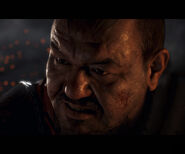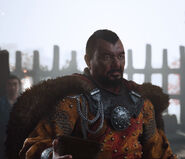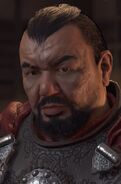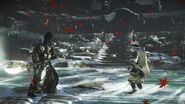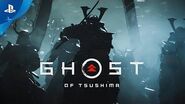Brother, you are a warrior. I can see that. You trained your whole life for this. And you have won battles that lesser men have called unwinnable, yes? But while you were sharpening your sword, do you know how I prepared for today? I learned. I know your language... your traditions... your beliefs... which villages to tame and... which to burn. So I ask you once again, samurai, do you surrender?
― Khotun Khan[src]
Khotun Khan (コトゥン・ハーン; Kotun Hān) is the main antagonist of Ghost of Tsushima. He was a cunning and ruthless leader of the Mongol Empire as well as led the forced invasion on Tsushima and Iki island with the help of his ally, the Eagle.
He is voiced by Patrick Gallagher (English) / Tsutomu Isobe (Japanese).
Biography[]
Khotun Khan is a cousin of Kublai Khan and grandson of Genghis Khan. He grew up to be a very successful and well-known General in the Mongol Empire, who grew up in China. Shortly before the Goryeo campaign, he released his favorite golden eagle, nicknamed Little Brother. Following the conquest of Goryeo, Khotun was engaged in an attack upon Japan. The Khan was eagerly ambitious and if he was successful, he would not only spread his name, but he would be able to vie for the title of Great Khan himself. Before leading the invasion, Khotun learned the Japanese language and used spies and informants to learn about Japan's history, politics, and culture.
Khotun began his conquest of Japan by invading the island of Tsushima. Khotun set out for Tsushima with a large invasion force consisting of thousands of Mongols, including of one his best generals, Temuge, aboard a massive Mongol fleet that he intends to use to blockade the island.
The Khan and the Mongols made landfall at Komoda Beach, where they became involved in a standoff with the island's samurai, led by Shimura. Harunobu Adachi, the husband of Lady Masako Adachi and the best swordsman on the island, attempts to challenge the Khan to single combat. Khotun replies by lighting the Samurai on fire and beheading him, an act that knowingly insults the samurai code of bushido. This enrages Shimura into ordering a frontal charge, resulting in the decimation of the Samurai. Knowing that the jito is more valuable alive, Khotun captures him and reveals his identity to him, explaining how he had prepared for this invasion. The Khan knocks Shimura out when he silently refuses to surrender and takes him to Castle Kaneda. The castle is soon attacked by Lord Shimura's nephew Jin Sakai, who fights his way through the Mongols to rescue his uncle and confronts the Khan on the Castle's bridge. Jin challenges the Khan to single combat, but is swiftly defeated. Khotun asks Jin to surrender, but when his face is cut by Jin, the Khan throws Jin from the bridge to the waters below.[1]
Meanwhile, the Khan's forces advance across the isle, pillaging and destroying many settlements, temples, and garrisons and setting up camps and strongholds along the way. During this time, Khotun engages in frequent conversations with a local monk, Daizo, who seeks to document his words and deeds in order to foster mutual understanding and prevent more bloodshed, partially out of eagerness to learn more about Japanese culture and history. Khotun confides in the monk that he plans to convince Shimura to join the Mongol cause, and offer to make him Shogun and let him rule Japan as Khotun's right-hand man, as well as aiding Khotun in overthrowing Kublai.
Khotun makes several attempts to convince Shimura to join his cause, counting on Shimura's over-reliance on the traditions of the samurai. Shimura is unwilling to speak to the Khan until he learns that Jin survived the earlier confrontation with Khotun. Noting the love that Shimura has for his nephew, Khotun asks the jito if he will abandon his children to their savage demises at the hands of the Mongols, noting that surrendering could ensure their safety. Shimura responds that he and Lord Sakai will fight until their last breath. The next time Khotun visits the imprisoned Jito, he gives him an update on Jin's activities: his men have found their brothers stabbed in the back, a direct violation of the Samurai honor code, which Shimura had used to enforce the belief that Samurai and Mongols are different.
Shimura is in disbelief of Khotun's words, and he points out that war brings out the worst in all men. Khotun attempts to appeal to Shimura's fear that his nephew will become what he hates unless he joins his empire's fight for peace. Shimura counters that the Khan does not really want allies, but soldiers to overthrow the Shogun, and continues to refuse. Khotun leaves, though not before warning the jito that it is only a matter of time before it is too late for Jin, and before he brings Shimura Jin's head. Khotun later makes one more visit to Shimura and informs him that Jin's dishonorable activities have increased to the point where he tears Mongols apart like a beast.
Shimura dismisses this by saying he's sure Khotun has done worse, leading Khotun to realize that Shimura still believes that they are different. Khotun argues that they fight for the same thing: a legacy that outlives them, which is in danger of falling apart thanks to his nephew becoming astray. Shimura counters that he won his legacy with duty and honor, and by restoring order to his home, while firmly refusing Khotun's offer. Not regarding Shimura's cooperation as crucial to his designs for the mainland, he informs that the jito that he is going to conquer his ancestral home, Castle Shimura, and leaves him to starve to this in this cell, alone and without honor.
In addition, Khotun receives word that Ryuzo and his Straw Hat Ronin are starving and have allied with Jin out of desperation. Khotun has his men treat some Straw Hat captives politely, and is later able to bribe Ryuzo and the Straw Hats to join the Mongols against their own people, winning them over due to the Straw Hats' desperate need for supplies, as well as instilling the notion that the Mongols will win the war against the Japanese. When Jin launches his assault on Castle Kaneda to rescue his uncle, Khotun offers to give Ryuzo immediate food for his men if he is able to stop Jin. He fails, and Jin rescues his uncle and takes Castle Kaneda from the Mongols.
Displeased by Ryuzo's failure, Khotun withholds the food for his men and takes Ryuzo with him to conquer Castle Shimura. To atone for Castle Kaneda's loss, the Khan forces Ryuzo to burn a captive peasant alive outside Shimura Castle, coercing them into opening the gates and surrendering to the Mongols.[2] Khotun continues his conversations with Daizo inside Castle Shimura, which he explains is strategically more important than Castle Kaneda because it shields his forces in the frozen wilds of the north. Khotun is confident that his enemies will exhaust themselves fighting each other and the Mongols, and stocks up on food, munitions and supplies, intending to depart for the mainland when the time is right.
During this time, Khotun had offer the eagle a deal on trying to break jin and make him into the killer kouthan wants him to be that he becomes increasingly fascinated with Jin after hearing the Eagle's death at the hands of jin also who has half the island believing that he is a vengeful Samurai spirit. This belief increases after Jin kills Temuge with the fearsome Ghost Stance, causing Khotun's men to believe that Jin, now known as the Ghost of Tsushima, is an invincible foe. Khotun sees an opportunity to divide the people, who adore the Ghost, from Lord Shimura and the other samurai. Following Temuge's death, Khotun decides that the Ghost has become too much of a problem and orders Ryuzo to put an end to him. However, Ryuzo convinces the Khan to give Jin a second chance. He lures Jin into a trap and captures him, along with his friend Taka, and leaves them tied to poles.
Khotun arrives not long afterwards to meet with Jin once again. He points out how he and Jin are both survivors and draws comparisons to both of them, such as how live under the shadows of their elders; in Khotun's case, living up to his grandfather. He asks why they should settle for scraps, when they have done enough to be legends. Khotun offers Jin amnesty if he surrenders and convinces his people to join the Mongols, reasoning that he could do it because of how much they admire him, but Jin refuses. Angered, Khotun unties Taka and hands him a katana, ordering him to kill Jin in exchange for his freedom. Taka attempts to attack Khotun, but Khotun easily subdues the blacksmith and beheads him to the horror of Jin. Khotun then leaves, intending to "find another" and make Jin choose again. Jin, however, manages to escape, swearing vengeance on the Khan and his allies.[3]
Later on, as Jin and Lord Shimura prepare to launch an attack on Castle Shimura, Khotun speaks to Ryuzo and tells him that the Samurai's honor code makes them easy to break. However, the Ghost has become unpredictable, and this makes him dangerous. The ensuing siege sees the Khan's forces pushed into the inner keep. Shimura then orders a frontal charge, but Khotun anticipates this and sends out horse chariots filled with explosives, which detonate, causing massive casualties to the samurai. This action causes Khotun's attempts to divide the Ghost and the Jito to come to a climax. More infuriated than ever at the Khan for his killing of Taka, Jin's desire to resort to dishonorable tactics lead him to cut ties with Lord Shimura.
He and Taka's vengeful older sister, Yuna, use piles of Wolfsbane flowers to create a poison. Jin subsequently infiltrates Castle Shimura and sneaks poison into the Mongols' food, killing them all. Jin also kills Ryuzo in a duel, resulting in the castle being successfully taken. Khotun, however, has already left to meet with his soldiers in the frozen wilds up north.[4] Khotun later learns that the poison of Wolfsbane flowers were used by Jin to massacre his soldiers, and orders his men to gather massive amounts of the deadly flower.[5] The Khan uses the poison to devastate the Kamiagata region, much to the disapproval of Daizo, and retreats to his base of operations in Izumi Harbor.
At this point, Khotun intends to sail for the mainland, content that Shimura and his reinforcements from the Shogun do not have the strength nor numbers to alter his plans, as Tsushima was only ever a place to resupply and prepare for the invasion of the mainland. Aware of the divisions between the emperor's court at Kyoto and the seat of the shogunate, Khotun intends to utilize Jin's poison against the mainland, ensuring a brutal conquest. He was unaware that Yuna, who had taken over for Jin after he was arrested by Shimura's men for his dishonorable tactics, had tracked him down to his base. She later arranged for Jin to escape the prison and meet her up north. They plotted a final attack on the Khan before he could flee the mainland, calling upon their allies, along with the assistance of Lord Shimura and the forces of the Shogun.
The battle of Port Izumi begins soon after, with the people of Tsushima gaining the upper hand after Lord Shimura's forces arrive. After locating the Khan from a watchtower, Jin confronts Khotun on a frozen lake. The Khan chastises him for not accepting Mongol rule, claiming all the death could have been avoided had Jin submitted, and declared that people of his mainland would suffer. Vowing that Khotun would never leave the island, Jin engages him in a fierce duel. Khotun is confident in his chances, believing that it is not his destiny to die here and that their duel will no different from the first. Jin, however, has learned many techniques and forms since their first encounter and overpowers the Khan.
Realizing that he cannot defeat the Ghost alone, Khotun flees to his flagship and calls for the assistance of his soldiers. Despite the help of his reinforcements, Khotun is overpowered by Jin, who shatters his spear, defeats his reinforcements, and disarms him of his sword and shield. Jin then impales Khotun with his sword, pinning him to a wooden beam on the boat. Khotun declares that he will forever be remembered, and one day someone will come and finish what he started but Jin mocks him in disgust, saying he'll be forgotten before beheading the Khan, avenging Taka.
The death of Khotun Khan cripples the Mongol invasion, sparing mainland Japan from the Mongol forces, and causing the bulk of the Khan's army to retreat back across the sea. Despite the Khan's death, many of his forces remained on Tsushima, continuing their fight against Jin and his allies.[6]
Personality[]
Khotun Khan is shown to be greatly feared by his enemies, and highly respected by his army. His authority amongst his men is unquestioned, and they are willing to resort to any tactics to defeat the Khan's enemies. His ruthlessness and lack of honor is shown when he uses a wine glass and a torch to incinerate Lord Adachi after the latter challenges him to a duel. He is also more than willing to use brutal force against non-combatants, including unarmed monks.
Despite his cruelty, the Khan has a capacity for mercy, if it suits his goals. He is willing to offer amnesty to those who surrender and fight for him. Typically, he takes advantage of those in a desperate situation, such as when Ryuzo and his men were starving and felt disillusioned in their fight. He uses this "divide and conquer" strategy in order to turn his enemies against each other, making his conquests easier. In his own words, he knows "which villages to tame, and which villages to burn."
In order to aid in his subjugation of Japan, the Khan has learned how to speak Japanese, and has extensive knowledge of Japanese culture. This knowledge allows him the ability to use the Samurai's code of honor against them, as he leads them into traps and causes Lord Shimura to doubt the honor of his nephew Jin. In addition, Khotun Khan is seen to value meritocracy, as he frequently employs individuals of great expertise, both originating from the vast Mongol Empire and from Japan, caring little for origins so long as people get the job done.
Khotun Khan's ambitions are vast. He seems discontent with the Mongol Empire's nomadic lifestyle, and favors the sedentary lifestyle of already established civilizations such as China or Japan. His conquest of Japan is designed to facilitate the beginnings of a new empire
Skills[]
"You forgot what it's like to fight someone who's stronger than you, to feel weak."
― Yuna to Jin, after their first encounter with Khotun Khan.
The Khan is a skilled warrior, utilizing a massive Guandao-like weapon in the instances he is seen in combat. In his first encounter with Jin, the Khan easily overwhelms his opponent. He is highly confident in his own skills, showing no fear when confronting Jin for the final time despite the latter's decimation of his army. However, once Jin gains the upper hand in combat against him, the Khan panics, fleeing for his command ship and calling reinforcements to aid him. In addition, when Jin wounds his face during their first encounter, the Khan loses his composure and flies into a rage, throttling Jin and hurling him off the bridge they were dueling on.
Trivia[]
- The real-life Mongol invasion of Tsushima in 1274 was commanded by Kublai Khan instead of the fictional Khotun Khan
- Khotun Khan cannot be defeated in the first duel at Castle Kaneda, as his health is artificially made to never drop to zero.
- In his onsen reflection of Khotun Khan, Jin wonders of the ways he'd kill the warlord which included the ideas of beheading, drowning and burning him like Khotun did lord Adachi. In the conclusion of the final battle at Izumi port, all of the three technically happened: Jin beheaded Khotun Khan and left his body in a burning Mongol vessel that's on its way to sink.

